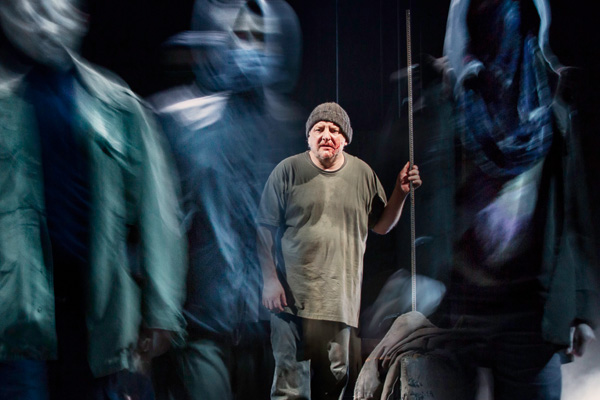OK, I was wrong. I’ve said it a million times but I now realise it’s perfectly feasible. Antique dramas can make sense in a modern location. Nicholas Hytner sets Timon of Athens slap bang in the middle of present-day London. The action begins in a mock-up of the National Gallery’s Sainsbury wing, complete with that dull, forbidding grey hue that some miserable nutcase chose for the walls. Ominously, hanging centre-stage, is El Greco’s swirly pink vision of Christ ejecting the moneylenders from the temple.
A launch party is in full swing. Champagne flows. A gang of yuppies, toadies, spivs and freeloaders has gathered to toast the opening of the ‘Timon Wing’. Glamorous sycophants hover around the millionaire philanthropist crying, ‘Timon, Timon!’ like hungry seagulls circling a discarded Big Mac. The bounty of Timon knows no bounds. He’s high on charity. Like some crazed love-child of Elton John and Mother Teresa, he spreads goodwill and cash in all directions. Here, he bails out a wrongly imprisoned nobleman. There, he grants a fortune to a handsome pauper besotted with a high-born floozie.
But this excess of sweetness and benevolence can’t last for ever. Sure enough, the fiscal oscillator ticks forward and Timon is plunged from success and affluence into penury and wretchedness. The plutocrat is bankrupt, his land mortgaged, his credit cards cancelled, his piggy-bank empty. Faced with a Himalayan debt crisis, he applies to the muckers and greasers who lapped up his largesse during the boom years. And they, of course, run a mile.
He slides into the underclass. Wearing an anorak stuffed with newspapers, Timon haunts the twilight habitat of the homeless. Here the scene shifts to the pillared concrete underpasses beneath the National Theatre itself. A nifty touch. He finds himself ruling a mob of outlaws as he denounces the corruption of wealth and power. He encourages crabbed-up whores to infect the city with genital creepy-crawlies. He becomes as besotted with hate as he ever was with generosity. When two former chums show up he chases them off with a fireman’s axe.
Simon Russell Beale, as bulbously energetic as ever, captures all of Timon’s contradictory registers. He easily manages the tricky descent from genial magnetism to bilious rage and indignation. His down-and-out phase brings him into contact with the cynical thinker, Apemantus, and their double-act is touching, and genuinely funny. Hilton McRae’s wintry Scots accent is a perfect vehicle for the philosopher’s scabrous insights.
One of the joys of the play is that it offers trusty Shakespearean themes in unfamiliar contexts. There are hints of Lear and the Fool, touches of Hamlet’s lyrical misanthropy, echoes of Iago’s bitter rhetoric. And it’s a script that doesn’t require a heavy night’s swotting beforehand. The storyline is cup-a-soup simple.
And, thank God, it has none of those brain-bending Shakespearean sub-plots with five sets of second cousins, all in masks, marrying each other in the final scene while some shipwrecked countess gets spliced to a cross-dressing duke who’s lost his lands to a scheming madcap brother-in-law. None of that. Just a rattling good tale of pride, arrogance and retribution. To mount this play in London, at this moment, and with this particular spin, is an exquisite piece of programming.
Steam Industry Theatre is back at the Scoop by Tower Bridge. Last year it delivered a hammer-blow to capitalism by staging a hoity-toity Brechtian drama extolling the virtues of Bolshevism. After the show, a bucket was passed around and donations were eagerly solicited to fund future propaganda efforts. It takes a lot of capital, apparently, to kill off capital.
This year, in a sweeter mood, it has devised a comic trilogy based on Homer and Aeschylus. My first attempt to catch the show was thwarted by thunderstorms. (Rain stops play at this open-air venue, alas.) Second time around, I saw the opening piece about Helen’s elopement with Paris. The show, which is aimed squarely at kids, is performed as a sitcom but it’s done with a genuine sense of scholarship and a reverence for the sources. Corny gags abound. ‘My ironing board didn’t arrive from Argos,’ complains one of the Trojan women. There are more challenging quips, too. We’re asked to consider why Helen is labelled ‘from Troy’ and not ‘from Sparta’, the home of her husband Menelaus. That’s the sort of textual conundrum that keeps classicists chatting long after they’ve put the rest of High Table to sleep.
There’s a real charm and warmth about this show. If you can dodge the deluges, you’ll have a ball. It’s free, too. They still pass the bucket around after the curtain-call but they’ve dropped the end-of-days rhetoric. Capitalism’s deadliest foe, they’ve realised, isn’t the anti-capitalist movement. It’s the capitalists.







Comments